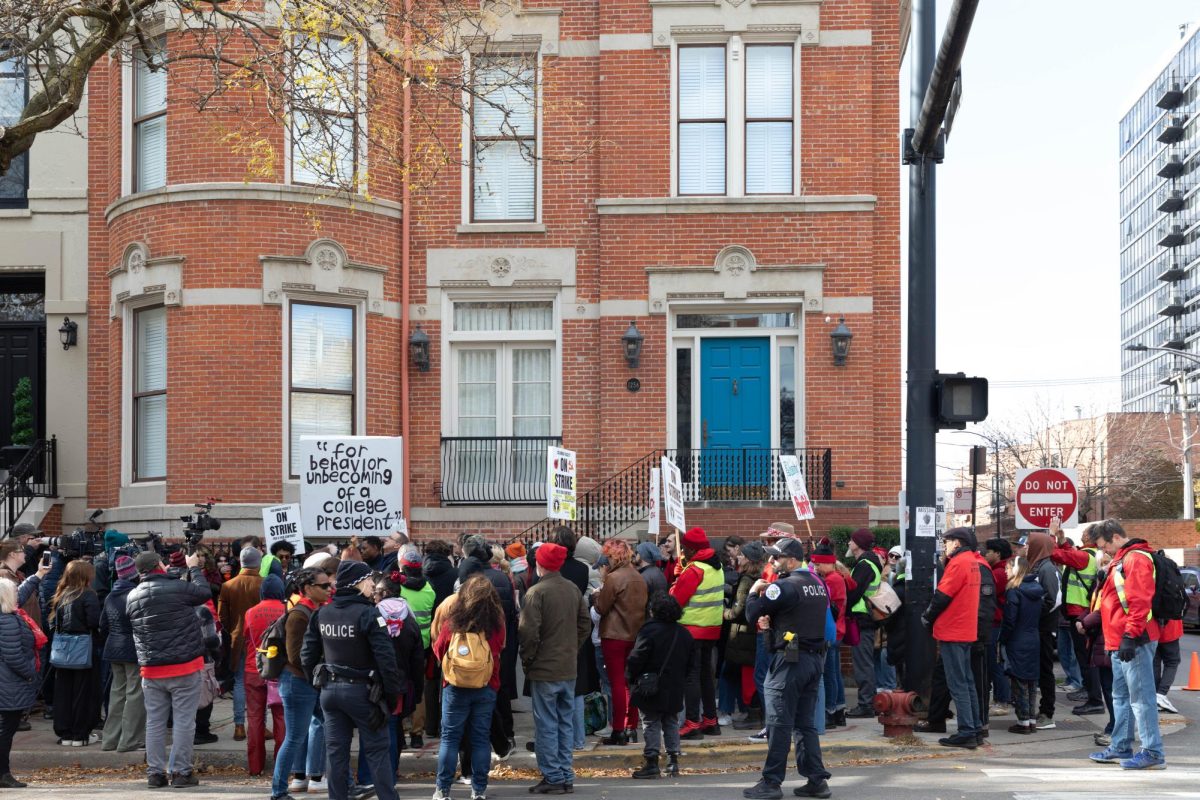
Abra Richardson
The former presidential residence 1258 N. LaSalle sold for $2.3 million. During the historic part-time faculty strike, union members and students protested outside the residence on Nov. 10, 2023.
Columbia College Chicago has sold its former presidential residence in the Gold Coast for $2.3 million, marking the end of a contentious chapter tied to the school’s leadership and financial struggles.
The three-story, 8,180-square-foot property at 1258 N. LaSalle Dr. closed in May, nearly a year after it was put back on the market. The final sale price was $400,000 below the college’s asking price. The home, originally purchased in 2000 for $1 million, underwent $2.6 million in renovations and was used for hosting donors and dignitaries. Despite those intentions, the purchase drew backlash from students and faculty when it was first announced and then for years after.
The house features five bedrooms, multiple living areas, two kitchens, an office, a library, a media room and an elevator. Built in 1895, it was first acquired to house then-President Warrick L. Carter, who served from 2003 until 2013. He died in 2017.
Sylvia Ramsay, a Chicago resident from Hyde Park, told the Chronicle in an interview that a lot of things attracted her to purchase the house, but it needs a lot of smaller renovations and “major things to do in it.”
The Chronicle learned the name of the buyer by searching public records in the City Clerk’s office. Ramsay was listed as the buyer on a special warranty deed filed that was part of the real estate transaction.
Ramsay said she currently has no plans for the house beyond maintaining it as a residence and was not aware of what the college used it for in the past.
“This is zoned residential and commercial. Right now, it’s going to start off being residential,” she said.
The last occupant was former President and CEO Kwang-Wu Kim, who recommended the property be sold as part of a strategy to reduce a $17 million deficit. Kim stepped down in July 2024, shortly after the home was re-listed. Interim President and CEO Jerry Tarrer, who succeeded Kim, did not reside in the house and currently lives in Flossmoor, a suburb south of Chicago.
The college had tried to sell the property once before in 2003, after the Board of Trustees authorized its sale. It was listed for $3.8 million but never sold.
In more recent years, the house again became a focal point for criticism. In 2021, the college faced scrutiny from the staff union after posting a job listing for a housekeeper to maintain the residence despite a protracted labor dispute. The listing was taken down after union members began applying for the role.
Tensions around the property intensified again during the seven-week part-time faculty strike in Fall 2023. In November, amid the ongoing labor action, dozens of students marched nearly three miles from campus to the LaSalle Street property. Striking faculty and student demonstrators labeled the residence a symbol of financial mismanagement as the college’s deficit climbed to $20 million, often referring to it publicly as a “mansion.”
Kim recommended the house be sold the following year.
Even after the property was listed for sale, it remained a source of campus humor. During his student commencement address at the first of two ceremonies on May 18, Elisha Dennard, who graduated with a bachelor’s in arts management, with a concentration in performing arts, joked about the residence.
“Over these past four years, we learned that life doesn’t always go as planned,” he said. “Who could have predicted that the president’s house would still be for sale?”
Jenna Davis, president of the Student Government Association, said the sale will allow for some financial relief.
“Obviously, we have a long way to go right now before we are at even, but anything counts in a time like this,” she told the Chronicle.
Diana Vallera, a part-time instructor in the School of Visual Arts and CFAC president, said she hopes the sale of the college’s former presidential residence marks the start of more responsible financial decisions.
“The president’s mansion was a symbol during the CFAC strike, representing radical economic inequality and highlighting that something was not right with claims of institutional poverty while living in a mansion,” Vallera said. “We hope that the sale of the mansion signals a new day of financial responsibility and a new relationship of collaboration and cooperation among Columbia’s constituencies to ensure that students succeed, and the college thrives.”
Additional reporting by Kate Larroder
Copy edited by Vanessa Orozco
